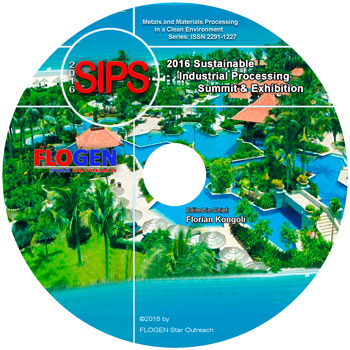2016-Sustainable Industrial Processing Summit
SIPS 2016 Volume 11: Physics, Advanced/Multifunctional Materials, Composite, Quasi-crystals, Coating
| Editors: | Kongoli F, Marquis F, Lu L, Xia H, Masset P, Rokicki P |
| Publisher: | Flogen Star OUTREACH |
| Publication Year: | 2016 |
| Pages: | 180 pages |
| ISBN: | 978-1-987820-56-0 |
| ISSN: | 2291-1227 (Metals and Materials Processing in a Clean Environment Series) |

CD shopping page
Energy Efficiency Assessment of University Buildings - Case Study: Technical Faculties Building
Violeta Nushi1; Vjollca Komoni2; Vlora Navakazi3; Justina Pula4; Mehmet Qelaj5;1UNIVERSITY OF PRISTINA "HASAN PRISHTINA", FACULTY OF CIVIL ENGINEERING AND ARCHITECTURE, DEPARMENT OF ARCHITECTURE, Pristina, Kosovo; 2UNIVERSITY OF PRISTINA, FACULTY OF ELECTRICAL AND COMPUTER ENGINEERING, Pristina, Kosovo; 3UNIVERSITY OF PRISTINA "HASAN PRISHTINA", FACULTY OF CIVIL ENGINEERING AND ARCHITECTURE, DEPARTMENT OF ARCHITECTURE, Pristina, Kosovo; 4UNIVERSITY OF PRISTINA "HASAN PRISHTINA", FACULTY OF ECONOMY, Pristina, Kosovo; 5MINISTRY OF ECONOMIC DEVELOPMENT, Pristina, Kosovo;
Type of Paper: Regular
Id Paper: 287
Topic: 21
Abstract:
Generating energy, as a key factor for the development of the country, implies a number of factors that requires solving its rational use in the context of sustainable economic, social, environmental and cultural issues. The aim of our research described in this paper is to investigate and evaluate several aspects of energy efficiency, such as source and use of energy and its loss in education buildings, when it comes to lighting and heating of the building during the learning process; as well as medium-term strategies for alternative energy sources for these items. The key issue in this study is based on analysis and assessment of enclosed architectural space and its constructive elements, electrical and heating installations of the case study building, the Faculty of Electrical and Computer Engineering, Faculty of Civil Engineering and Architecture and Faculty of Mechanical Engineering, so-called Technical Faculties Building (TFB). This paper is based on comparing the analysis from different viewpoints and energy indicators of the standard audit process in certain buildings in Kosovo. Methods and tools used in this study are a standard audit, initiated by acquaintances of existing state - identification of energy consumption and energy efficiency measures. On the basis of the needs and capacity utilization of energy supply in TFB; and in relevant local and international experiences, this paper attends to contribute in addressing the efficient energy use, in suggesting improvements of constructive elements and alternative energy sources, in particular, discusses the general awareness of the university authorities in Kosovo, in relation to energy efficiency and economic benefits of improved technical-engineering conditions of educational buildings.